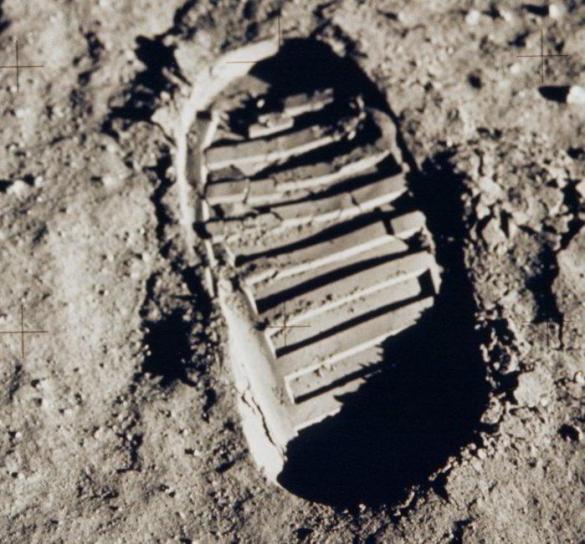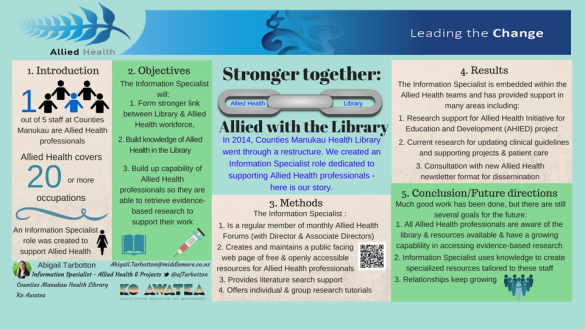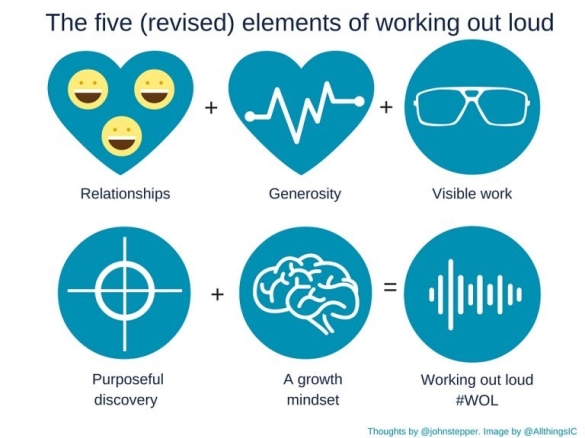
One small step for man, one giant leap for mankind…
That’s a little bit the way I felt as I participated in a health conference – the first ever non-librarian conference I had been to. It felt like a whole new world, and a new place to explore. I’ll try to capture just a few of my thoughts and impressions from attending this conference, and the wealth of knowledge that I learned.
My current position is Information Specialist (Liaison Librarian if you like) with a special focus on Allied Health & Projects. A large part of my work is getting to understand the many different occupations and specialties that are included in Allied Health and help support their research and best practice. This involves doing literature searches to support projects or work initiatives, teaching information tutorials and one-on-one research tutorials, and attending Allied Health events where possible. Just to give you a bit of an idea, a really simple explanation of Allied Health is anyone working in health that isn’t a doctor or a nurse. Some of the many occupations that fit under the umbrella of Allied Health are:
- audiology
- dietitians
- occupational therapy
- physiotherapy
- psychology
- speech and language therapy
- social work
I had a poster accepted that talked about how my role was created (probably about a year before I came on board) to specifically liaise with Allied Health & Projects to help support research and evidence-based practice in these areas. I’ve included it below, in case you are interested to see it:

Anyway, my overall impressions from the conference (and from some of the themes that were raised) is that many of the same challenges that face Allied Health face librarians as well. The first keynote by Professor Sharon Mickan focused on the importance of using evidence-based research to support our practice, and she also mentioned what a useful resource health librarians are in both locating resources, creating search strategies, and also co-authoring the research along with the relevant health professionals. The other two keynotes, by Professor Susan Nancarrow, and Dr Graeme Benny, picked up the key themes of education, and how many people are going through long years of training, and then the difficulty of getting jobs that are appropriate to their specializations. They also picked up on the importance of being generalists as well, but still utilizing our areas of expertise and providing that guidance and expert knowledge in multidisciplinary teams. Many of these themes would be equally applicable to librarians, I believe – particularly being generalists, learning new skills, but also making the most of the traditional librarian skills & knowledge as we also work in multidisciplinary teams, and get outside of the library and embedded into wider work teams.
One of the other themes – which I know a lot of other librarians can say Amen to! – is that we are not getting more resources, but we need to keep offering and often extending our service. So the little mantra is “Instead of getting more resources, we need to be more resourceful” – for librarians, what can we do with what we have already to work smarter, to help more people, to allow better & equitable access to resources and knowledge?
Many of the presentations were also inspiring, with many great examples of working together, working smarter with the resources we have, and keeping it focused on the customer/user/patient/person – what do they need and is the service we are providing enough for them?
It was encouraging being able to interact with a lot of different people from different disciplines and perspectives, and to learn more about what they do, and how they are doing it differently in response to changing needs.
While there wasn’t an offical hashtag, one of the participants suggested that we all use #nzahconf16 to index our tweets. Many of the conference participants weren’t on Twitter, so it was really exciting to see some of them pick it up for the first time, or dust off their old accounts, and join the conversation. You can also read a storify of the tweets that I collated from the two day conference.
Overall, I had a blast at conference – thank you very much to my workplace for the support to go and present a poster, and network with Allied Health professionals from around the country. It’s definitely helped me understand some of the key challenges facing Allied Health practitioners in their practice, and hopefully it will help me continue to grow my knowledge of each of these areas so I can support them better in my on-going work.
So back to you now:
- Have you been to a conference other than a library conference?
- What were your impressions?
- How do you think attending professional development events that are not focused on librarians will help you develop into a better information professional?






